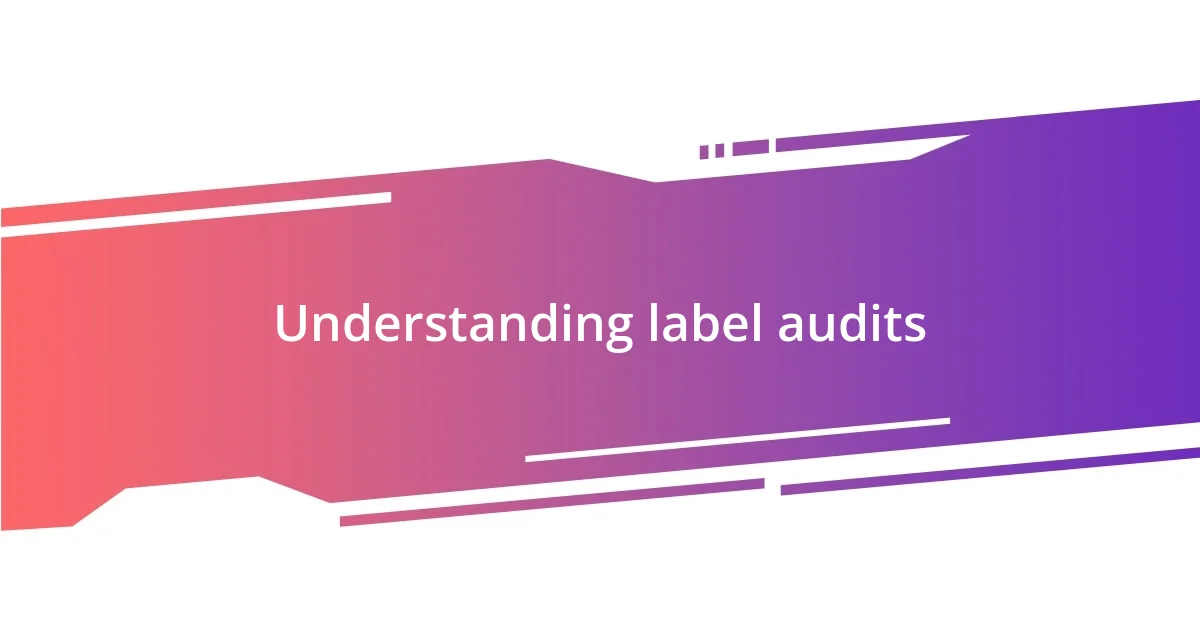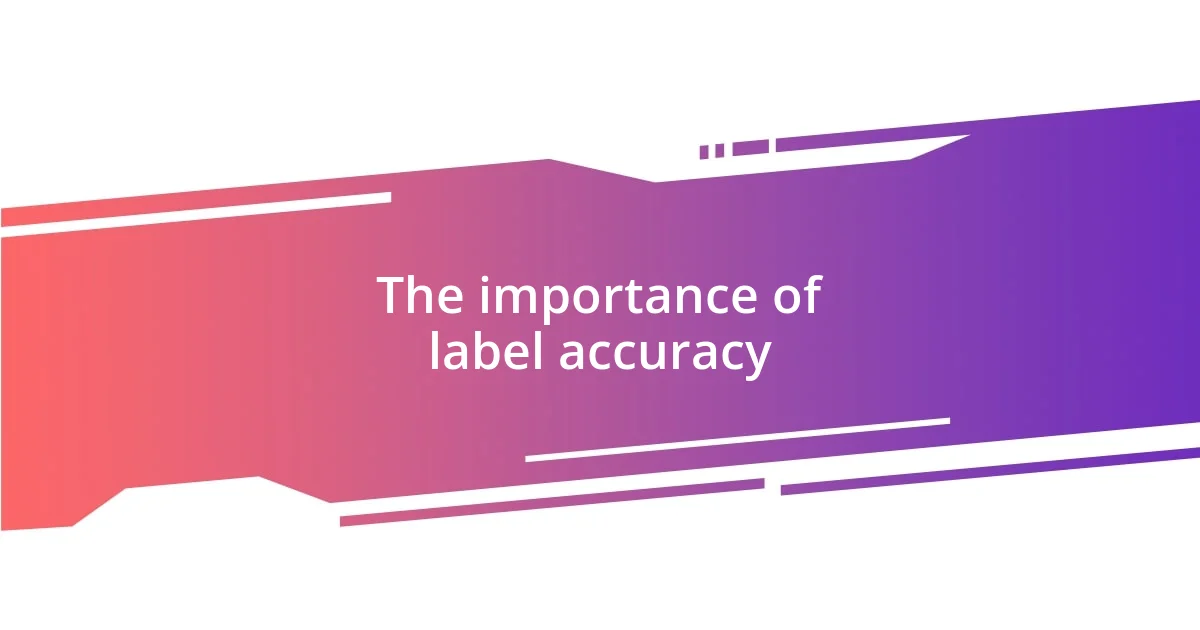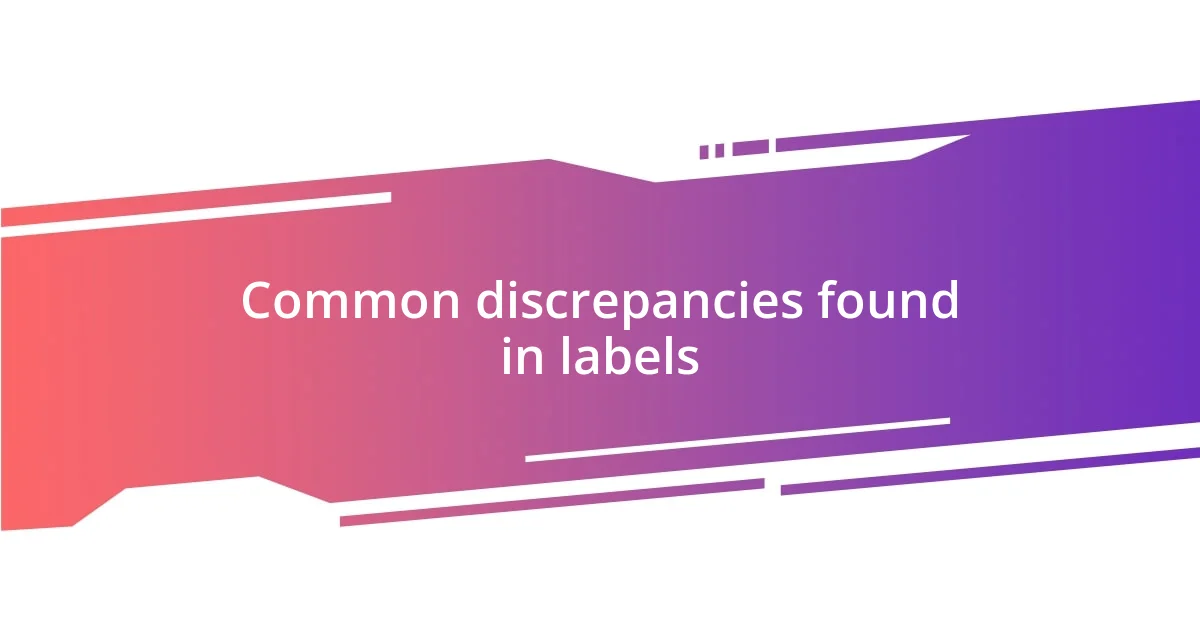Key takeaways:
- Label audits ensure accuracy and compliance, which is vital for consumer safety and brand integrity, preventing serious health risks and legal issues.
- Common discrepancies include incorrect ingredient lists, misleading health claims, and missing allergen information, which can undermine consumer trust and brand reputation.
- Investing in label accuracy fosters lasting relationships with consumers, emphasizing the ethical responsibility brands have in protecting their customers.

Understanding label audits
When I first encountered label audits, I thought they were just about checking compliance, but I soon realized there’s much more involved. A label audit is a careful review of product labeling to ensure that all information is accurate, consistent, and in line with regulatory standards. It was eye-opening for me to discover how many small errors can lead to significant issues, both for manufacturers and consumers.
I remember a specific audit where I found a missing allergen statement on a snack product. The feeling of urgency hit me hard — not just because of the compliance issue, but because it could have serious health implications for someone with allergies. Have you ever considered how something as simple as a label can impact lives? This experience helped me appreciate the responsibility that comes with labeling, transforming my perspective on its importance in consumer safety.
Label audits are also instrumental in maintaining brand integrity. They serve as a checkpoint, ensuring that the promises made on the label align with what’s actually in the product. Reflecting on my journey, I can’t help but think: how many brands truly invest in this critical process? Understanding label audits means recognizing their role in building trust between businesses and consumers, which is something we should all prioritize.

The importance of label accuracy
Label accuracy is paramount for ensuring consumer safety. I remember a time when I purchased a health supplement that claimed to have specific ingredients. Imagine my surprise when a label audit revealed discrepancies in the formulation! It revealed a lack of attention to detail that could have misled consumers, possibly affecting their health choices. This experience highlighted not just regulatory compliance but also the broader implications of trust.
In my experience, accurate labels help prevent costly legal issues too. I once worked with a company facing a lawsuit because their labels didn’t match the actual product composition. The stress that ensued was monumental, affecting not only the finances but the morale of everyone involved. What I learned is that a seemingly small oversight in labeling can spiral into significant ramifications that reach far beyond the production line.
Furthermore, label accuracy directly influences brand reputation. I’ve seen brands flourish because they took labeling seriously, while others, who neglected this responsibility, suffered reputational damage. It’s a delicate balance: when consumers trust what they see on a label, they’re more likely to be loyal to the brand. My takeaway? Investing effort in label accuracy is not just a regulatory necessity; it’s a crucial aspect of fostering lasting relationships with consumers.
| Aspect | Importance |
|---|---|
| Consumer Safety | Prevents health risks and allergic reactions |
| Legal Compliance | Avoids costly lawsuits and fines |
| Brand Trust | Builds loyalty and enhances reputation |

Common discrepancies found in labels
One of the most common discrepancies I’ve encountered in label audits is incorrect ingredient lists. I recall inspecting a popular beverage and discovering that the sweetener listed was entirely different from what was actually used. How many consumers unwittingly consume something they were trying to avoid? This kind of mismatch can lead to betrayal in trust and raises serious ethical concerns that ripple through the industry.
Another frequent issue involves misleading health claims. I had the chance to evaluate a snack brand that boasted “low-fat” on its packaging. Upon deeper investigation, I learned that it was compensated with higher sugar content, rendering that claim rather disingenuous. This made me ponder: how do consumers decipher what’s genuine? Ultimately, such discrepancies can mislead health-conscious individuals in their choices, and brands risk losing their credibility by prioritizing marketing over transparency.
Lastly, I can’t overlook the prevalence of missing or ambiguous allergen information. During one audit, I stumbled upon a salad dressing that lacked visibility on potential cross-contamination. My heart raced thinking about how an innocent mistake could lead to severe reactions. Isn’t it alarming how a small detail can have life-altering effects? This experience reinforced my belief that every word on a label counts — it’s not just about compliance; it’s about protecting vulnerable consumers.















